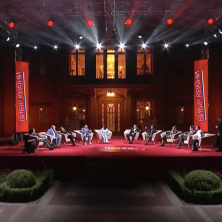During the election marathon at 1+1 channel the special editionof the “Right to Power” moved to Mezhygirya. Experts and experienced parliamentarians discussed how political developments are to unfold and suggested a few options of what the newly elected MPs are to do.VoxCheck had analyzed what happened there.
True
“We need to keep the calendar provided by the elections law. If I’m not mistaken, it is as follows: 10 days to sum everything up, 5 days to announce the resultsAfter that, Verkhovna Rada has 30 days to hold the first session. However, within 20 days out of these 30, deputies are required to resign from their current jobs, close their businesses, solve some technical issues, etc.”
Serhiy Vlasenko, VO “Batkivshchyna” (52:42- 53:24)
CEC establishes the elections results within 15 days sincethe elections – this concerns both nationwide and single-member districts (Art. 98, 99)
The official announcementof the election results is made within5 days sincethe results are established. The results are considered official after they are published in the “Holos Ukrayiny” (Voice of Ukraine) and “Uryadovy Kuryer” (Governmental Courier) newspapers(Art. 100).
No later than on the 20th day after the election results are officially announced, a deputy submits to theCEC a document confirming resignation from work or office, which may be incompatible with the deputy mandate. Only after one meets this condition, the CEC registers the elected individual as a people’s deputy. This is also the ground for takinga people’s deputy oath. (Art. 101).
The first session of a new convocation is held no later than on the 30th day after the official results are announced. (Art 15).
Therefore, considering the maximum time frame,, deputies are to expect the following developments:
- results are established no later than August, 5th;
- results are officially announced no later than August, 10th;
- newly-elected deputies submit their papers to the CEC no later than August, 30th.
- the first session is held no later than September, 9th.
True
“According to the Constitution, deputies take the oath during the session. It also states that sessions are held in the building of the Verkhovna Rada. All the actions that are taken out of this building have always been questioned legally.”
Serhiy Vlasenko, VO “Batkivshchyna” (53:49 – 54:02)
Article 79 of the Ukrainian Constitution states that before entering the office, deputies take an oath before the Verkhovna Rada. It happens before the first session in the session hall of the Verkhovna Rada. Its address is also included – Kyiv, Hrushevskoho street, 5 (Art. 2, 14, 15 of the Regulations).
Other sessions can be moved to a different location in two cases. First, if the majority of the deputies decide to hold the session someplace else. (Art. 2, paragraph 2). Second, if the head of the Verkhovna Rada choosesto move the session in case of martial law or state of emergency. (Art. 11, paragraph 4). If these conditions are not met, the legitimacyof the sessions is indeed in question.
True
“If the “Servant of the People” doesn’t have enough votes of the elected candidates (to form the coalition – editor), self-nominees can join them to form the faction. Thus, they can have more than 226 votes. This faction will get the powers of the coalition and will be able to form the government on its own..”
Serhii Shcherbyna, RBC Ukraine, editor-in-chief (1:06:03 – 1:06:19)
True, self-nominated deputies who won their single-member districts can join the factions. Deputies nominated by a political party, which failed to pass the election barrier, can also join factions. (Art. 58 of the Regulations).
True
“Traditionally, the opposition gets several committees and a position of a vice-speaker.”
Serhii Shcherbyna, RBC Ukraine, editor-in-chief (1:07:30 – 1:07:43)
According to the Regulations (Art. 81 paragraph 4), heads of the committees are determined proportionally, so the committees should not be chaired by the deputies from the coalition only.
Regarding the position of the vice-speaker or, in other words, the deputy head of the Verkhovna Rada, the Regulations do not indicate that it is given to the opposition. The same goes for the first vice-speaker (Art. 79).
The law on the parliamentary opposition can formally establish the opposition’s rights. The necessity to adopt it was discussed earlier and mentioned once again recently. However, this is not going to happen anytime soon: the draft law has to be submitted, then agreed upon, and then voted on.
To check how “traditional” appointments were in the past, let’s look at the party affiliation of the vice-speakers and the first vice speakers, and whether these parties were a part of a coalition or not. We started the check from the Vth convocation, as the data are available from this moment.
Indeed, from V to VII convocations, there is a tendency of either the first vice-speaker or vice speaker not belonging to the ruling party. VIII convocation broke with that tradition (see the table).
We assess the statement as “true” because the tradition is indeed noticeable.
| Convocation and years in office | Head of the Verkhovna Rada (speaker) | First deputy (first vice-speaker) | Deputy (vice-speaker) |
| V 2006 – 2007 |
Oleksandr Moroz
(Socialist Party of Ukraine) |
Adam Martynyuk
(Communist Party of Ukraine) |
Mykola Tomenko
(Yulia Tymoshenko Bloc) |
| VI 2007 – 2008 |
Arseniy Yatsenyuk
(Our Ukraine–People’s Self-Defense Bloc) |
Oleksandr Lavrynovych
(Party of Regions) / Adam Martynyuk (Communist Party of Ukraine) |
Mykola Tomenko
(Yulia Tymoshenko Bloc) |
| VI 2008 – 2010 |
Volodymyr Lytvyn
(Lytvyn Bloc) |
Adam Martynyuk
(Communist Party of Ukraine) |
Mykola Tomenko
(Yulia Tymoshenko Bloc) |
| VI 2010 – 2012 |
Volodymyr Lytvyn
(Lytvyn Bloc) |
Adam Martynyuk
(Communist Party of Ukraine) |
Mykola Tomenko
(Yulia Tymoshenko Bloc) |
| VII 2012 – 2014 |
Volodymyr Rybak
(Party of Regions) |
Ігор Калєтнік
(Communist Party of Ukraine) |
Ruslan Koshulynsky
(Svoboda) |
| VII 2014 |
Oleksandr Turchynov
(Batkivshchyna) |
Ruslan Koshulynsky
(Svoboda) |
|
| VIII 2014 – 2016 |
Volodymyr Groysman
(BPP) |
Andriy Parubiy
(People’s Front) |
Oksana Syroid
(Samopomich) |
| VIII 2016 – 2019 |
Andriy Parubiy
(People’s front) |
Iryna Gerashchenko
(BPP) |
Oksana Syroid
(Samopomich) |
Table legend: green – a member of a coalition party; red – a member of a non-coalition party.
True
“Self-nominated MPs have a right to join these factions and form groups. However, groups do not have the rights of factions. According to the Constitution, they cannot form the coalition.”
Serhii Shcherbyna, RBC Ukraine, editor-in-chief (1:05:03 – 1:05:27)
According to the Regulations, self-nominated MPs do have a right to join factions (Art. 58) or form groups which will have the rights of factions (Art. 59).
However, according to the Constitution (Art. 83), only the coalition of deputy factions can nominate the prime minister.
Instead of conclusion
What’s next? Well, guessing is pointless. What the deputies of the IX convocation are capable of, we will find it soon enough. Meanwhile, VoxCheck continues to refute myths and analyze the truthfulness of politicians and experts.
Attention
The author doesn`t work for, consult to, own shares in or receive funding from any company or organization that would benefit from this article, and have no relevant affiliations




